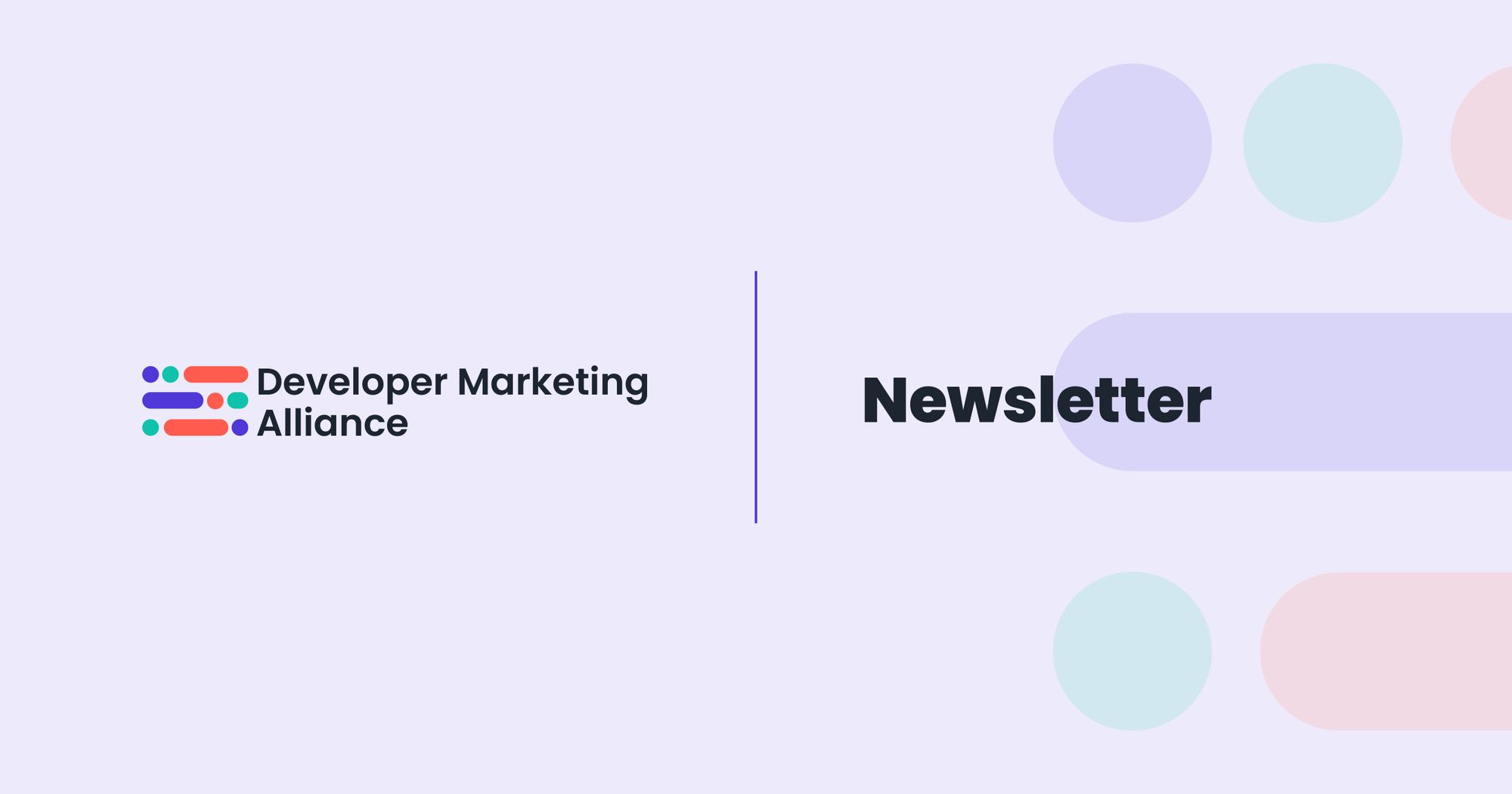In this article, Jon Rooney, Group VP of Industry Marketing at Oracle, explains why while developer marketing is marketing without marketing, it still falls under the criteria of marketing.
I’ll outline why you should market to developers, what’s different or hard about marketing to developers, and methods that’ll get you over the line, with some examples of dev marketing done well.
I'm going to talk about developer marketing; in particular, how developer marketing is marketing without marketing, but it's still marketing.
Level set on developers
Who are these developers? What are their jobs in organizations?
We've all talked about and heard about how software is eating the world and digital transformation but what role do developers play and who are they?
Developers are the people at an organization who are responsible for building, deploying, and increasingly today, maintaining our operating software, products, and services that drive the business.
To get a good sense of who they are demographical, we are all unbelievably fortunate to live in a world where Mike Judge decided to make Silicon Valley. So if you think about a character like Carla or Dinesh, it's a pretty good example and a pretty fun way to get a sense into the firmographics, the mindset, and the preferences of developers.
That's the quick level set on developers. Let's talk about marketing.
Level set on marketing
What do we do in marketing? We think about two primary things academically, we create awareness, and we drive demand.
We want people to hear about the things, the services, the products that our organizations offer, and we want them to want it and start to figure out:
- How do I get this?
- How do I learn more?
- How do I try it out?
There's the old adage, which I think there's some always helpful truth in the sense that at the end of the day, the job of marketing is to make sales jobs easier. I'll swing back and see how that impacts in terms of developer marketing.
But then again, we're all marketers here. We know at the end of the day, it's a comms job, we are trying to communicate some concepts and ideas, even if they tend to be very technical for technical users, which is the case with developers.
Why market to developers?
I think 10, 15, 20 years ago it was a lot less common. Developers, in terms of inside an organization, were users, they tended to not really make much of a decision, there wasn't much of a market for developer tools in and of itself, it wasn't really as important.
Stephen O'Grady, who started an analyst firm called Red Monk wrote a really great important book almost maybe 10 years ago now called The New Kingmakers. There's really great stuff in that book, I will paraphrase a few of them.

Developers build on your platform to increase its value
Number one, why market to developers? Developers build on your platform to increase it’s value, this has been present in the software industry, technology, and a lot of different places, a lot of different industries for decades.
If you think about operating systems and when the PC really started growing up in the 90s, that virtuous cycle, which is you want the most developers to target your platform so you have the most apps on top of the platform, which will attract the most users, which will attract the most developers to build the most apps.
That virtuous cycle, which is at the foundation of software, whether we're talking about enterprise or consumer is really important. Developers became the heart of that, and companies like Microsoft and Apple in the 90s really built upon that.
So that's when you are a platform in and of itself, and there are ways to do that well, and there are ways to not do it well.
If you look at what Facebook and Twitter have done to really rub some of the developer community the wrong way and not really build up the platform from an extensibility standpoint is an example of how that's not always working for everybody.
Developers integrate with your services to extend reach
Secondarily, what do developers do? They integrate with your services to extend reach. So maybe your offering, your products, or your service isn't a platform in and of itself but developers in building applications and building applications increasingly today, you hear the term composite applications from various places and hitting a bunch of API calls, you want to make sure that developers both know-how and have a reason to, the value proposition for developer, to even integrate into your business.
Think about a company like Stripe from the financial services and payment standpoint, that's now this really essential service that developers integrate into all sorts of applications, and I'll talk about Stripe in a little bit.
Stripe knows building out that awareness and demand for their services for developers is super important to the health of their business. Those are the two platforms and services ways of looking at developers.
Developers influence major tech investments
Developers increasingly, and I've seen this a lot in enterprise software, influence major tech investments. That may be investments in terms of public cloud provider, in some cases, hardware stacks, in some cases, SaaS offerings.
Even if they don't necessarily hold the purse in terms of the team in the organization that has the budget, they have a tremendous amount of influence. That's something O'Grady talks about a lot in New Kingmakers.
So making sure the developers take a look at an offering, even if it's not something they're directly going to use to do their jobs to say how extensible is it? What does support look like? What does documentation look like? Is there an ecosystem of other developers interacting and working with this product? It becomes really important.
I mean, look at the work Salesforce has done around first their Heroku acquisition, and then force and app whatever it's called today, but it becomes really important and adds a ton of value to the platform.
Again, if you're thinking about, "Well, I'm going to buy a SaaS offering", you would think what do developers really have to do with that? That's abstracted away. No, you think about extensibility, you think about interaction points. So really important.
Developers use your offering to do their job
Fourth and finally, in my case both at Splunk and now at New Relic, and certainly before at Microsoft, are developers using your tools, your software, your offering, to help them do their jobs, in terms to help them build, deploy or operate software?
It's a much smaller use case compared to the rest of them, but it is really important and it's actually been a lot of the anchoring of my experience here.
What's different or hard about it?
We've all heard stories about how you can't market to developers, they're too cynical, they can't stand marketing, they're allergic to marketing. I don't think that's necessarily the case and I'll talk about that soon.
But let's talk about what's different about it, and why that difference may make it look like it's hard.

Developers are busy, often focused on the task-at-hand
Number one, developers are super busy, they're often focused on the task at hand, and traditionally, in most organizations, particularly on the enterprise, they're not necessarily the organization that is chartered with evaluating, purchasing, and integrating enterprise-wide tools or enterprise-wide systems.
Developers are swamped with new tech all the time
They are swamped with new technology all the time. I mean, one of the amazing things about the software industry, and really every industry around digital transformation in last 20 years, is how quickly and how much the technology has changed.
Whether we're talking about storage and storage capacity, whether we're talking about the availability to compute, whether we're talking about massive abstractions and how web services work, and different frameworks and all this stuff.
Part of the job as a developer today is trying to figure out, of the tons of signals that are coming your way, what's useful to you, what's really helpful. I'll get to that a second.
Developers generally aren’t buyers, but they’re key influencers
I mentioned this before, while developers generally aren't buyers, they are key influencers. If you're running more of a traditional enterprise software motion inside your organization, and you're thinking about doing account planning, who has influence?
Very often, and I've seen it lots of times in my career where the account team, the AE, in particular, is taken a bit by surprise by the participation, or the influence of developers in an organization.
I think that is only going to increase and I think, as product marketers, we need to help our field counterparts to navigate and understand that.
Developers think they’re immune to marketing
Finally, developers like to think they're immune to marketing, certainly traditional marketing things that we'll talk about. But again, if you decompose what we mean by marketing, we decompose what we mean around creating awareness and driving demand, I think we can actually get to a nice place for everybody.
What works?
This is an important thing for all of us to understand if we're going to really go at this. What are the things that work in developer marketing?
I'll talk about some concepts and some design principles and get into some examples.
Be tangibly, immediately useful
The first one is be tangibly immediately useful. Help developers solve problems. Developers come from organizations where they're constantly either solving a problem that's right in front of them, whether that is fixing a bug or trying to get an app out the door or potentially even evaluating something larger and more strategic.
As much as your offering, as much as you as a product marketer can put something in front of them, whether it's very top of the funnel from an awareness standpoint, or something more consideration like during a PLC or some evaluation period, be really useful and be really useful in ways developers can get hands-on with what they're talking about.

If it is to be able to integrate your service via an API, let people try that, let people reduce all of the friction.
Without a reg wall
The traditional tactics around, we're gonna put a white paper behind a reg wall and then have a webinar and then we'll lead score based on that - I'll talk about that in a second. No, make sure developers get access to all the things so they can see and feel the things for themselves.
That is an important thing I think we can all do to help as product marketers.
Offer fast, free access
Along the same lines, make sure there's fast free access to whatever it is you're offering. To talk about something is one thing, maybe to show a demo is another thing, but really the proof is in the pudding, the proof is in the experience a developer has working with that organization.
That being said, think about the value proposition in terms of what's in it for developers, and make sure you communicate that and see that holistically.
What’s in it for the developer?
When we talk about being useful, that's not just "Hey, we're able to solve this task" but also, if I'm a developer, I have a very valuable skill set, I don't have a lot of time, where I'm investing my time is really important.
You want to make sure they're part of the value proposition. For example, if you're a platform and you want people to build apps on top of your platform and monetize it, show the reach, show the ability to monetize that, that is a huge part of the success that Apple's had around iOS and that platform.
Even if you talked to developers in the early days, Objective C was tough to deal with, people didn't really like Xcode but the business case was there in terms of users and market opportunity. So don't lose sight of that, developers do not.
Particularly independent developers that are trying to figure out which platform should I build on in order to build my business? And there are all sorts of companies that have been really successful there but you can't lose sight of that fact around what's in it for the developer?
Have a unique voice that’s reflected across the brand
This is where I think the notion that developers are immune to marketing is untrue. I think they may have different preferences or tastes or may manifest differently than it would for other personas, particularly in the enterprise. But having a voice, having a brand.
Sports Hackday
A friend of mine and I put together a hackathon years ago up in Seattle, it was a few different companies it wasn't specific to any one vendor, it wasn't specific to any one technology.
The theme was really around sports and APIs and integrating stuff. But we knew it was really important for us to have a visual identity for the brand. We wanted it to be something that was cool and appealed to developers.
It was nerdy and inside jokey and I was working with the agency like, "I want something that kind of looks like the Motorhead logo, but with tech stuff, and also sports", and that's is what we came up with, and this was cool.
People wore it on their stuff and put their stickers on their laptop, and all the things that felt like, "Yep, people are saying this is a cool brand or this is something visually that reflects well on them", which is again, a big part of marketing is in brand identity.
PQLs not MQLs
Finally, I mentioned this a little bit in terms of what works - product qualified leads, not marketing qualified leads.
Again, the signal in terms of is somebody ready to buy or move on or adopt or activate, or whatever term you want to use in terms of the funnel is going to be much different than it is for other buyers.
Don't think about "Oh, somebody watched this webinar, or downloaded this white paper. Now let's put them in a BDR SDR queue". No, you should put them in a position where you know they'll be ready to buy based on what they're already doing with your products and services.
So if they're already seeing value, they're already finding use in your products and services that's the point to say, "Okay, how do we expand that with those folks", and I think having as much insight, having as much data to that, but also really more that mindset around the proof is in the pudding, get people hands-on keyboard, get people actually using the thing and make sure the thing lives up to the claim.
That's really a lot of the heart of developer marketing.

Who’s doing it well?
Finally, let's talk about who's doing it well. There are a number of organizations, obviously, that have developer marketing, developer marketing programs. It depends a lot on the type of the organization and what they're offering is. Let's take a look at a few tactics.
Stripe
I mentioned Stripe earlier about being useful and being helpful to developers as they go to look to solve a problem.
Docs are marketing and docs are critical. That is an area in which developers evaluate either companies or technologies or open-source projects, what does the support look like? What do the docs look like? Again, what does the ecosystem look like?
The better you do, not only maintaining this, the notion of a doc site as a repository of knowledge or a system of record for all of the technical information that you need, but also utilize them in blog posts, or recipes, or whatever you put in front of developers to say, "Hey, here's this problem that is probably relevant to you, or could be relevant to you, here's how to solve it step by step using this documentation".
And it could also include other systems or other technologies, whatever it is, make sure that it's holistic, it's about solving that person's problems versus just talking about features and functionalities and speeds and feeds of your individual offering.
I think that's one way to think about docs and hands-on recipes, and making sure that, again, developers have a path to go do the things for themselves. That's a very rational, pragmatic way of looking at developers.
GitHub
On the flip side of that, think more about brand and brand affinity, look at GitHub, you can see someone on Twitter talking about the swag bag that was mailed to them from GitHub, and it matters, it really matters.
I've been to tons of developer conferences over the years, and people talk about "That's a cool sticker", or "That's a cool thing here". And programs, Microsoft did this for years, Apple did it for years, lots of organizations had the notion of a developer MVP or whatever program that really wanted to recognize and keep close folks in the ecosystem, in the community that was investing heavily.
Here's an example of somebody unsolicited showing genuine excitement and genuine happiness about the outreach they're getting from GitHub. This is not about solving a specific problem, this is about, "Hey, here's we are we care about you."
As I mentioned earlier, there are some companies where what you actually want developers to do is use your product to solve their problems in building stuff. Obviously, GitHub is at the heart of that, but a great example of something that's much more emotional, much more traditional marketing.
Think about that and think about what the voice looks like, the tone and the feel of all of those things.
Twilio
Another thing that's emotional over here, I mentioned Daryl Hall and John Oates, Hall & Oates, the pop and soul duo from my hometown of Philadelphia. I don't know if folks remember this, this is one of the most brilliant acts of developer marketing I can think of off the top of my head was Twilio.
This was eight years ago so Twilio was a much smaller company than it is now but they were from the get-go, developer-first focused on having a really simple time to value in terms of write a little bit of code, start seeing the things work right away.
Well, anyway, somebody at Twilio built this little app where you could dial a phone number, and it was called Callin' Oates. Using Twilio, you would dial a phone number and it would start playing a Hall & Oates song.
Kind of goofy, kind of silly, brilliant, got Twilio a ton of attention and it got to show people in a really fun way "Oh, here's the thing that I can do and do pretty easily".
That's a good example. I don't know if the Twilio folks would even think of that as a campaign but I still think about it, and it's been eight years.
Laurence Moroney
Finally, from a real tangible thing, when I talk about the idea of being useful to developers, I can't emphasize enough the value of being useful holistically. Not just on what your particular product does, or offering does, but think about if I'm a developer, and I'm in this general space:
- What are the things that they care about?
- And they really want to know? And,
- How do you enable them to do that?
I think the large cloud providers, Google, AWS, Microsoft, do a great job of helping educate, train, and uplevel all sorts of developers around core key technologies to help build their toolset that's primary before "Hey, I can actually use our widget to do this".
I worked with Laurence Moroney years ago at Microsoft, fantastic guy, fantastic developer advocate, fantastic teacher.
He's at Google now just helping people learning about TensorFlow. If you look him up, he'll talk about all sorts of data science things, but that notion of "Hey, you are a developer, we're going to help you gain the skills, get the education around our core technologies, core offerings more holistically", and goodness will come back.
I mentioned earlier, one of our goals in marketing is to help sales do their job. I think with developers, it's a little bit harder because it's less of a direct path and more of a long game as you have developers start to get some value, as you start to potentially be a hub for knowledge and learning around developers.
I think Puppet did it great for years around DevOps practices. It wasn't just their offering, it was to think about DevOps holistically.
I think these are examples of companies that have done it and are doing it really well.
Tips for marketers
Useful things to think of as marketers are:
- How do we think about developers?
- What can we do in our organizations?
- How can we partner either with the technical field, PMs, developer advocates, developer evangelists, or developer relations folks, whatever you call them inside your organization, to make sure you get these points across?
If you've heard that developers are mean to marketing, it's not true. It's just different.
Hopefully, this article was helpful to you and gave a little bit of taste of it.
Sign up to our newsletter to get the latest content straight in your inbox.






